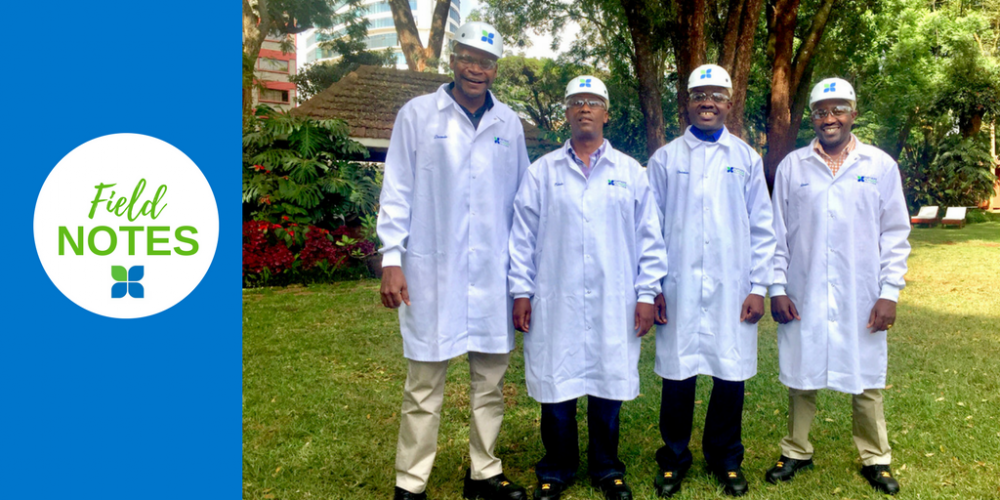
Safe Food Comes from Safe People and Safe Production
In February, PFS held its 2018 Food Tech Summit in Nairobi, Kenya, where our Africa-based food technologist/program managers met with their Minneapolis-based counterparts for a busy three day working session. The team worked on new initiatives focused on adding more value for our client companies early on in the process of working with PFS and, in particular, communicating our primary focus on workplace safety.
Since 2016, PFS has been directly hiring food technologists to work as program managers in Africa, in collaboration with partner impact investors, to identify high-potential food processors in country and engage them on projects to improve their capacity to produce safe, nutritious foods. This highly-motivated team with deep training and experience in the food processing sector includes Christian Dedzo in Ghana, Daouda Sangare in Cote d'Ivoire, Johnson Kiragu in Kenya, and Edwin Gafa in Uganda.
This summit was the first time all four program managers met together and offered a great opportunity for team building and process alignment, as well as portfolio management and volunteer experience. Our program managers, based in four different countries, shared stories and best practices on navigating the food-processing sector in their home countries. They also discussed how to best explain what PFS offers to clients in places where Partners in Food Solutions is new.
In recent months, the team has been creating resources they can use to portray PFS’s value of workplace safety and good manufacturing practices to our clients. Our clients themselves identified their need for information on building a culture of safety at work due to repeated incidents of workplace injuries and even deaths.
In partnership with our newest PFS senior advisor, Kurt Schnieder, Uganda Program Manager Edwin Gafa presented the team with a newly developed Client Safety Brochure, which acts as both an assessment tool and a guide. It contains a safety checklist that the team has already begun using to assess clients’ GMP and workplace safety needs. The brochure, titled “Safe food comes from safe people and safe production,” emphasizes the importance that PFS and our corporate partners place on workplace safety.
In addition to sharing the new safety assessment and guidelines, the team received PFS-branded personal protective equipment (PPE), which they can wear and serve as an example while visiting both active and prospective clients.
With their safety brochures and PPE, our field team are well-equipped to demonstrate and teach the importance of workplace safety while giving clients the tools for improving their own facilities.
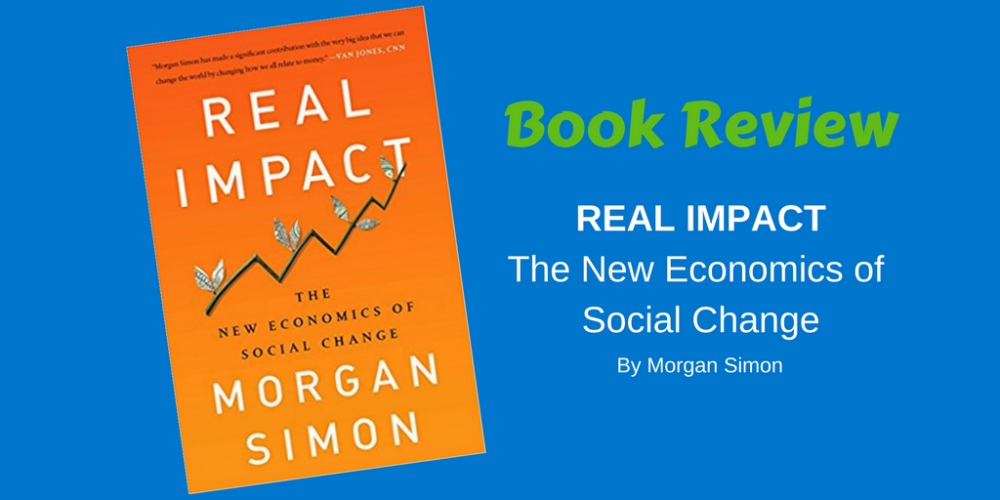
Book Review: Real Impact by Morgan Simon
For over a decade, impact investing – investments intended to generate social or environmental impact - has been a stealth trend in development. Partners in Food Solutions is also part of this trend, having established relationships with firms like Root Capital and Grassroots Business Fund, to leverage PFS expert know-how with their financial support to their portfolio clients.
Understandably, the idea of supporting social good while earning a financial return can sound too good to be true. The feel-good goals of impact investing, which could seem impossible to measure, make it vulnerable to cynics. That ambiguity, coupled with enough esoteric-sounding financial terms, can make the concept feel inaccessible to the modern day non-millionaire.
And yet, the bandwagon keeps growing. As income inequality grows, the world is calling for a global economic readjustment, not just in millions – but billions - of dollars.
In that sense, this book comes at just the right time. Ms. Simon walks the line between activist and MBA, bridging what was once a marriage of strange bedfellows. Bringing an activist voice and an investor attitude, Ms. Simon calls for a more rounded, thoughtful approach to investing, one that takes a whole world perspective. After all, diverting cash flows to extinguish poverty only works if you aren’t also holding the matches.
Real Impact is a helpful guidebook, categorizing, critiquing and championing impact investment in a way that is entirely readable. Ms. Simon outlines the development, its definitions, its shortcomings, and her vision for how to make it work. And if you find yourself without billions of dollars, she even includes concrete steps for the everyday person on how to make your own impactful investments.
Visit Morgan Simon's website HERE.
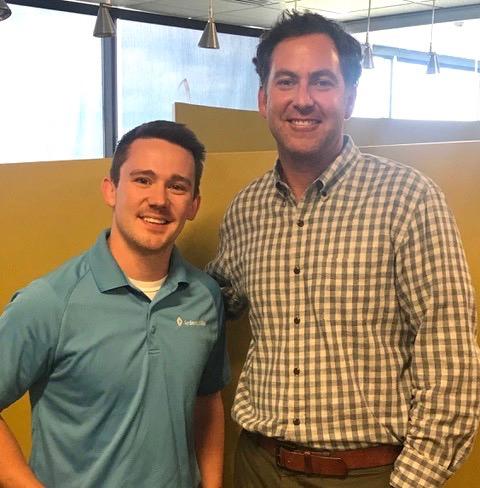
Volunteer Matt Sisbach works to simplify safety
When Matt Sisbach (left, with PFS CEO Jeff Dykstra,) a Environment Health and Safety Manager at Ardent Mills, was asked to help create a standard safety training program for a flour mill in Tanzania he thought it would be a pretty straightforward task. It turned out that it wasn’t quite that straightforward.
Though he knew that the workers spoke a language other than English, what he didn’t consider was that many of the workers are illiterate. “It was an interesting challenge,” he says, “I had to figure out a way to simplify the training but still have the same impact as I would using written language.”
He says rethinking the way to communicate safety also got him thinking differently about how he does that in his own job at Ardent Mills. “It was a challenge in a good way. It made me really think about how I could simplify training materials and training within my own job,” he says, and with a laugh adds, “We don’t want to put people to sleep with our training.”
Matt also says that volunteering for Partners in Food Solutions has been a unique and meaningful opportunity to work in the spirit of Ardent Mills’ core values of trust, serving, simplicity and safety.
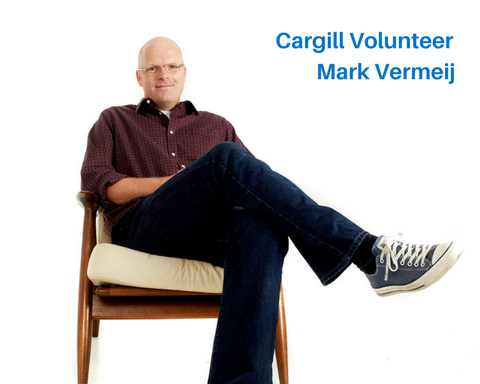
Volunteer Profile: Mark Vermeij
Mark Vermeij has over 20 years of experience at Cargill in oil refining. When he was recruited to join PFS in order to provide support to Jackma Enterprises, a food oil producer in Tanzania, on the construction of their food oil refinery, Mark was working in Cargill’s Center of Excellence for refined oil. “Jackma was not familiar with the technology, neither the process of the refining oil or how to manage quality control. In Tanzania, there are specification that refined oil has to meet so I started helping them to understand how to update their practices to create quality oil that meets these standards,” said Mark.
Mark played an integral role by offering technical support to Jackma, answering questions that came up as the processor began constructing their oil refinery. When the newly purchased refinery machinery did not come with a manual, Mark utilized his connections internationally at Cargill to get the necessary information on the machinery from the supplier in India. With this information, Jackma was able to expedite the construction of the oil refinery.
Mark was also quick to admit that he also acquired key knowledge from his time working with Jackma. “For me, the most valuable piece was learning about the context that these processors are working in. These experiences open your eyes to how business is done in various parts of the world and I put all of those experiences in my backpack so when I’m talking to managers at Cargill about expected complications during construction or the timeline when we build in different countries, I have a frame of reference that informs my decisions,” he said.
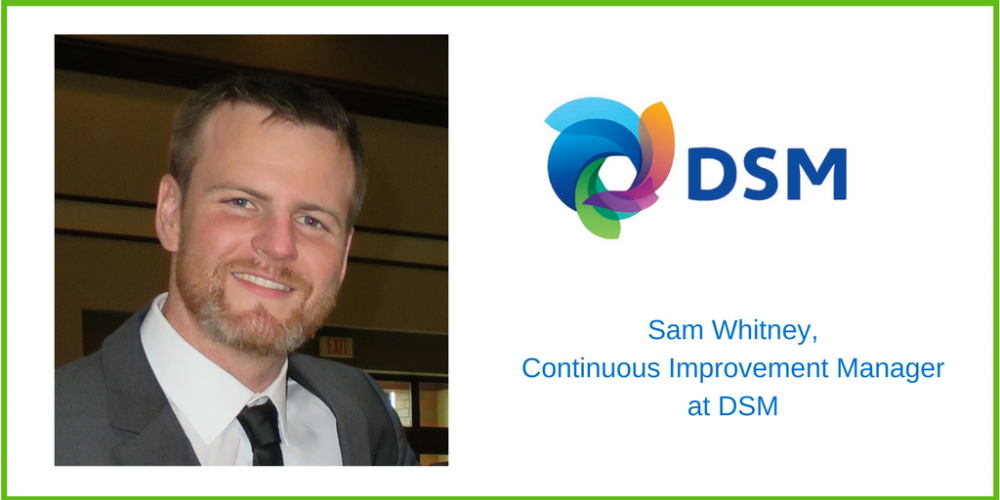
Volunteer Profile: Sam Whitney
“It’s gratifying to support these entrepreneurs and see the difference our work can make,” says Sam Whitney, a continuous improvement manager at DSM. One thing that he loves about his three plus years of volunteering with PFS is that the work that they do for one client can have an exponential impact by being shared with others. One example of that impact is a fortification training program that Sam and a team of other volunteers developed for workers at three companies in Tanzania - Kilonda, Katundu and Chamwino. The training explained the causes and consequences of malnutrition, the role vitamins play in our bodies, food fortification and dosifiers. He says that it’s important for employees to understand not just how to fortify flour, but also why food is fortified because that information will be shared throughout the larger community and create awareness of, and demand for, fortified foods.